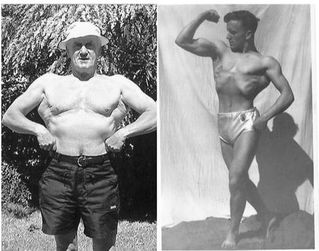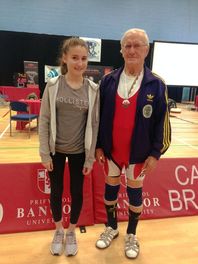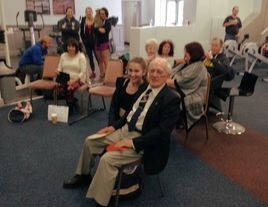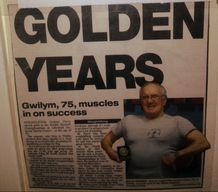AuthorA 20 year old fitness enthusiast and dedicated Olympic style weightlifter. I am a Level 2 Weightlifting coach, Powerlifter, and non-competitive Irish dancer. I'm determined to live a healthier lifestyle and take care of my body whilst influencing other young people to do so. I never doubt my ability to achieve something; I just change what I'm doing until I succeed. Archives
May 2021
|
Back to Blog
Interviewing my Weightlifting coach5/1/2018 It's been three whole months since I last posted a blog post and I'm afraid you may hear from me less and less the closer I get towards my GCSE's in May. However, although my posts may not be consistent, I've still been training and eat healthily when possible! This post is an interview featuring my Weightlifting coach/ 86 year old grandad, Gwilym Parry. His answers to my questions are very interesting and I love that he always has some sort of backstory to say about most topics we discussed (even in this 2 hour interview I learnt some new things about him!). Please carry on reading to hear more about his experiences. How did you get into physical training/ Weightlifting? Gwilym through the years Gwilym through the years I had asthma as a child which lasted for quite a long time, meaning that I couldn't go to school very often and I didn't have much time outside of the hospital. When I was around 15 years old, it seemed to get better so I started to ride my bike to the local swimming baths and would do a couple of lengths. As I'd swim, I felt that all my worries would just float away in the water. Eventually, I bought a springy bar (shaped like a horse-shoe) from a man who ran exercise courses and began to do some isometric exercises with it, I still use this now. This introduced me to 'physical culture' which is commonly known as bodybuilding nowadays. I was introduced to Olympic Weightlifting through a friend of mines boss (Mr Johnstone) who was a Weightlifter and moved to my town from London due to London being bombed during the war. Mr Johnstone asked my friend and I if we wanted to try Olympic Weightlifting at his home , so we did. But some time after we had to leave as his wife didn't like it. After that, we went to a farm in Chester and used an old chickenhouse to lift in. After this, I joined the airforce and asked my Mother to buy me some weights, I then trained in my conservatory. It wasn't until after I left the airforce that I continued lifting frequently again. What awards do you have? Gwilym and I at the 2015 European championships in Bangor Gwilym and I at the 2015 European championships in Bangor I currently have a bronze medal in the 2001 Kefalonia World Masters championships, a bronze medal in the 2002 Melbourne World Masters games, a silver medal in the 2006 World Masters championships (France) and a bronze medal in the 2015 European Masters. Along with those awards, I have also participated in some British Masters championships (In 1999, 2001, 2003 and 2015) which I have placed second in 1999, 2001 and 2003. In the 2015 British Masters championships I placed first. Although, I have not competed since 2015, I still continue to dabble and coach my granddaughter and some children from a local youth club (The OASIS Weightlifting Squad). What other hobbies do you have?I used to play the clarinet and the flute, but then I took up Judo for a few years. I soon quit this and focused on other sports and hobbies. I began to learn Tai Chi at my local gym and took up Golf. I became captain of the Octel Golf Society, but I still continued to mix with other sports too. Nowadays, I occasionally play golf but I regularly teach a Tai Chi class and Olympic Weightlifting. How long have you been coaching for and when did you start Weightlifting?I began coaching when I was around 20 years old, so I have been coaching for 66 years. I began Olympic Weightlifting when I was 16 or 17 years old, so I have been Olympic Weightlifting for 70 years. How do you think our club could improve?I think we should get more young people lifting, however now they cannot officially compete until they're 13 years old. Since our club was created to provide an activity for the local youth club children, it would be good to gain more lifters so that the youth club also benefits by more members joining. What is your biggest accomplishment within the sport?I would say that my biggest accomplishment in Olympic Weightlifting would be winning a silver medal in the World Masters Championships in France and my bronze medal in the Melbourne World games. In your opinion, who are the most inspirational Weightlifters?I believe the most inspirational Weightlifters were Julian Creus and Jim Halliday. Jim Halliday actually came to the gym I coached at to present prizes at a competition! They were the best British Weightlifters at the time and nobody has impacted and inspired me as much since. What is the best and worst part about being a coach?The best part about being a coach is driving home after a competition with a car full of kids who are all pleased with their medals. Then seeing their parents being happy with what their child has achieved and the children beaming when showing their parents. The worst part about being a coach is being made to feel like a babysitter for naughty children. Sometimes I've had naughty children who don't want to lift and it has been difficult to get them to train due to other activities that the kids want to spend their time doing during the Youth Club. Nowadays the kids arent as bad, but in the past I found myself chasing up kids to try and get them to lift. Are there any Weightlifting memories that make you smile or laugh? Gwilym refereeing (not when the funny incident happened) Gwilym refereeing (not when the funny incident happened) I remember one time when I was refereeing that a man's testicle popped out of his leotard during his squat in the Snatch lift! When he fixed it after the first and second lift, there was a round of applause from the entire audience. He only noticed it because a child started pointing and laughing at him! Another time when I was hosting a friendly Powerlifting competition in a young offenders prison, a man was waiting for the referee to tell him when he could squat. However, he was waiting for a while as the referee had gone and fallen asleep! What are some mistakes Olympic Weightlifters are making nowadays?The majority of lifters are actually Weight swingers rather than Weightlifters. To become a Weightlifter you need to be coached as it isn't natural to know how to correctly lift the bar. A common misconception is that it is correct to swing the barbell out and away from the body whilst lifting. The majority of lifters and coaches are even unaware of the difference between Weight swingers and Weightlifters as most coaches are only able to teach Weight swinging. To become a Weightlifter, the OASIS club and I believe that the barbell must be lifted from the floor to the second key position (the bottom part of the shallow S), this meaning that the barbell is kept close to the body. If you could pass down one piece of advice to me involving sport or Weightlifting, what would it be? I would say that you should try various sports that come along, you never know what you could excel in! You never know, Weightlifting may not be the one for you, it can be riddled with drugs and it is nowadays not easy to aspire to be a good Weightlifter if there are drug takers. You'll find this in other sports obviously, but I mean that you should put yourself out there and try other things instead of devoting yourself to one sport. Pressure can also cause damage to the body which can impact you from doing other things in life. However, Olympic Weightlifting movements are excellent to help other sports and to keep fit. Don't be too discouraged if you cannot achieve greatness or be the best, as if you're injured there's not much to do afterwards and your career would be over. I advise you to dabble in as many things as you can, do this and I'm sure your enthusiasm will help you to do well in anything! Thank you Gwilym for taking part in my interview, you're certainly an inspiration to me and I am thoroughly thankful for all that you do involving Weightlifting. Thanks for reading this different type of blog post, I may continue to conduct more interviews in the future.
0 Comments
Read More
Your comment will be posted after it is approved.
Leave a Reply. |